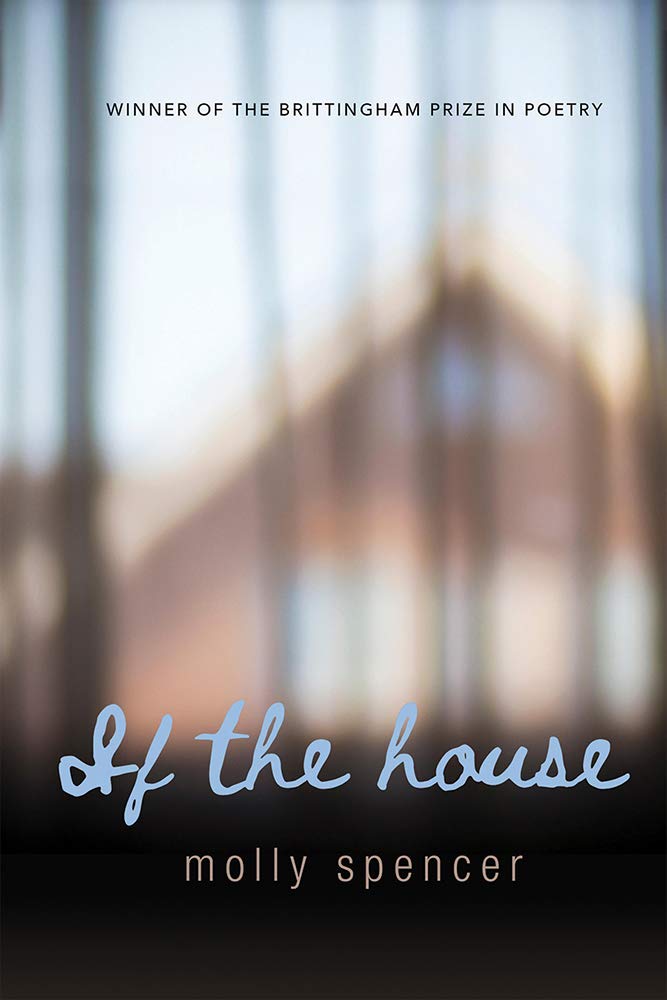An Edge Felt in the Body
by Joannie Stangeland | Contributing Writer

If the house
Molly Spencer
University of Wisconsin Press, 2019
In Molly Spencer’s debut poetry collection If the house, the surest thing is uncertainty—the speaker’s commitment to transitional spaces, her dwelling the liminal, becomes a comfort. Reading these poems, I find distance and dislocation, a disconnection between people, a disconnection between the speaker as a woman grown and the girl she remembers being. These gaps between time, between distance, between what is said and what isn’t, create a place for negotiation and the possibility to be one’s own self.
The conditional mood set up by the book’s title continues in the first poem, “If I tell you everything, maybe as day fades.” In the poem, Spencer says,
If I tell you a leaf
in the table is a distance
with the stanza break visually representing the distance. Later in the poem, she describes spilled milk as
moonlight shoaling
slow, pledged to the crack
where the leaf drops in, loosedevotion. Destined. Undaunted.
Then the slipping through.
Spencer invites us to slip with the speaker into the rooms and realms she constructs. Situated in the preparation of a search for and move to a new house, the collection includes elegies, meditations, poems about past homes, poems about real-estate disclosures, and conversations.
The disclosure poems hint at what might be left unsaid, while the conversations stress what is or isn’t heard. The disruptions—the gaps in understanding—are immediate. For example, in “Conversation with Lace Thong and Car Keys”:
Down the hall the thunk of a drawer
Opening the broken music of his hands
Running over its contents did you find themShe says yes he says good she says
Blows back through the kitchen
The keys jangle their little found song gotta go
He says bye she says bye
Spencer’s lack of punctuation and her line breaks enact the disconnection between people, which is amplified by capitalizing the beginning of each line.
Then there’s that image of “the broken music of his hands.” In If the house, Spencer is generous with imagery, creating precise, almost synesthetic moments. Images recur like compass points throughout the book: the edge as cracks for slipping through, the blade for cutting or embodying an edge—where we escape or what escapes us, what we miss in the world and in each other—the stones that, being hard, provide a grounding, a kind of permanence, the lake, and its companion in vastness, the meadow.
Spencer pulls these images together in the sequence “Meadow | A Reckoning.” In the first section, the speaker says, “Come, meadow, rise and unfold, / Linen down the hill. Sing me your ditch songs—.” The meadow-as-cloth morphs in the second section into “Strung sheets on the line” and then “the sun will fold up / Its cloth of light come evening.”
In the third section, she remembers the blade or edge:
And the shore was an edge felt in the body.
The water’s low, obsessive song, stone-strung.
Say lapis. Say stung with the windward chill
Of a long winter . . .
The fourth section complicates these images:
Somewhere in the meadow is everything
You believed in. Saints and worn stones. That cloth
Would hold and keep you warm come winter.
During this trust in warmth, the tense changes, and the voice moves from second person to third as the speaker recalls, “There was a cage inside her for stung things—.” In that space between past and present, she notes that “There’s no such thing as remembering / A meadow and walking it, too,” which reminds us of the distance that memory inflicts and requires.
Meadow and lake, two memories of depth, come together in the sixth section:
You’ll never convince the meadow of drop-off,
Though you’ve waded the shoals of her grasses
Recounting that cobalt blade, the slip down,. . .
Blown waves of field after field washing by.
Here, the speaker works to reconcile two beloved landscapes that stand in for her and her younger self, two bodies, two ways of seeing the world that are both the same and dissimilar. In the last stanza, she says, “Yes, the sky will go down / to metal whole-cloth,” and then
There’s
A place inside the body that can’t forget,
A room where various pasts pick at the bones.
Girl, you won’t feel a thing. The meadow will
Lie down. The first snows hardly ever stick.
As Spencer ventures into memory to find some alignment with the present, she investigates language—the multiplicity of words and their ultimate failures. In “Night Repairs,” the speaker advises “Don’t ask / whether the lake’s rolling swells / mean to cradle or to lull.” In “Disclosures | If you are aware of any shared features,” she says
A single mouth to taste
the dust of those words again—for poorer till death.Or a breastbone—as if to cleave
did not mean to make a way through by splittingapart. As if it did not also mean
stick fast to.
Here, language demonstrates the difficulty of coming to common understanding between two households or between two people, the difficulty of communicating in a marriage.
A love of language, despite or because of its inconstancy, binds this collection together, as Spencer builds and dismantles a world where past and present, land and lake, blend and question. Describing and negotiating these intersections and shifts, Spencer’s poems unsettle and then reassure, proclaiming, quietly, that it is possible to “put yourself back together. Now rise up / tender and gleam.”
—
Joannie Stangeland is the author of several collections, most recently The Scene You See. Her poems have also appeared in New England Review, Boulevard, Prairie Schooner, and other journals. Joannie holds an MFA from the Rainier Writing Workshop.
